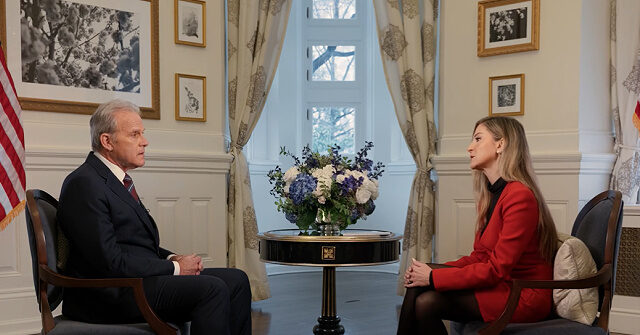Former Israeli U.S. Ambassador Michael Oren spoke with PragerU CEO Marissa Streit ahead of President Donald Trump’s inauguration in Washington, DC, detailing the newly reached ceasefire deal and the”moral strategic dilemmas” Israel is facing to bring home hostages still held captive by Hamas terrorists.
The interview took place more than 15 months after the horrific October 7 attack in Israel, where Hamas terrorists brutally murdered Israelis and people visiting from other countries at the Nova music festival and dragged off hundreds of hostages, including Israelis and at least seven Americans. As part of the ceasefire deal — reached right before Trump’s inauguration— Israel will withdraw partially from Gaza and release roughly 1,900 terrorists in exchange for the 33 hostages who have been held illegally by Hamas terrorists for more than a year of war. The ceasefire is supposed to last for six weeks.
“Israelis will say, ‘yes, we’re going to face greater terrorism in the future from these people,’” Oren said of releasing terrorists to secure the hostages. “But as a society, by retrieving our hostages, we’ll be much better and stronger and able to meet that challenge. If we fail to redeem the hostages, we’ll be weaker — even though we may fail to face a much weaker Hamas.”
“So there is no good choice here,” he added. “It is a choice between the lesser of two massively nightmarish scenarios, right? And there’s been no country in history, certainly not this country, the state of Israel, that has ever faced moral strategic dilemmas that we face today.”
WATCH: Ambassador Michael Oren Explains the Israel/Hamas Hostage Negotiations
Streit, who served in the Israel Defense Forces (IDF), observed that Israel is facing “contradictory goals” because “one is to end the war by eliminating Hamas, a terrorist group that wants to annihilate the State of Israel…” and the other goal “is to bring the hostages back.”
“And in order to bring the hostages back, you have to release hundreds and hundreds of terrorists that are telling you they are going to come back and commit these crimes again — and very likely try to take additional hostages and certainly more lives,” she said.
“And those terrorists in our jails have killed Israelis,” Oren responded. “Two of my friends who have lost loved ones, one a brother, one a father, are devastated today because the people who killed their loved ones are getting out scot-free. [The terrorists] are going to get a hero’s welcome coming home. So think what this does to the national morale. There’s there’s no end to the horrors here, Marissa. There just aren’t.”
Oren also discussed the difficulties the IDF has faced in fighting Hamas terrorists in Gaza.
“[I]n this war, we didn’t change our military doctrine once — we changed our military doctrine dozens of times during the war. The Israeli Army in Gaza encountered a military challenge unlike any encountered by any army in history. In history. The biggest battles fought by the United States and the Iraq War were in Mosul and Fallujah, and in both battles, the U.S. military encountered 5,000 armed terrorists in a city, [which] was largely abandoned with almost no tunnel structure,” he said.
“The Israeli army goes into Gaza and counts 30,000 terrorists fighting behind a population of two and a half million. You have almost nowhere to run. Densely built up and fighting, not just above ground, but below ground in 450 miles of tunnels, nothing like it in history,” he continued. “And Israeli forces win. They win, and they win. But in total contrast to everything you hear on American television, Israeli forces achieve a one to one combatant to civilian fatality rate.”
In the event Hamas breaks the ceasefire, Oren said Trump should “let us resume the fighting.” He also said it is “unlikely” a ceasefire deal would have been reached without Trump becoming president, but he countered that the deal, as it stands, is “better for Hamas.”
RELATED: IDF Chief of Staff, Southern Command General Resign over October 7
“…[T]his is the price we pay for the failure of October 7. We all understood there was a price to be paid. We weren’t getting away from this for free,” he said. “And by the way, we’re just at the beginning of paying the price. Because there has to be a national introspection and a comeuppance [for the] people [who] were responsible for the failures of October 7.”
“The army didn’t show up. We didn’t predict it — 252 Israelis were dragged in captivity because the army didn’t show up, because the army didn’t predict,” he added.
Read the full article here


